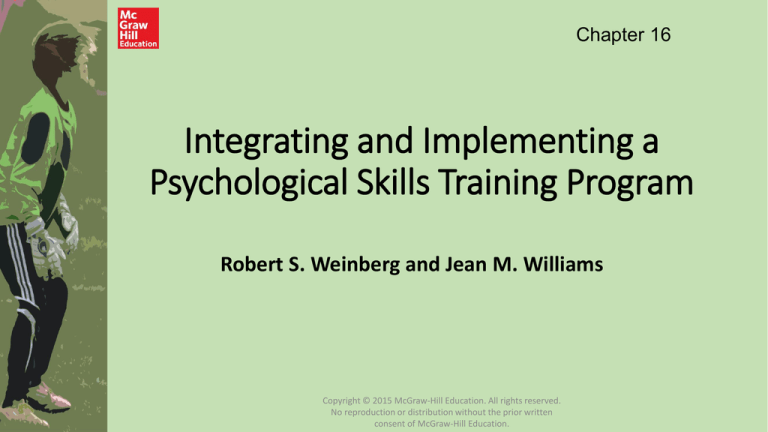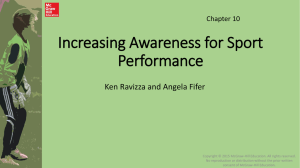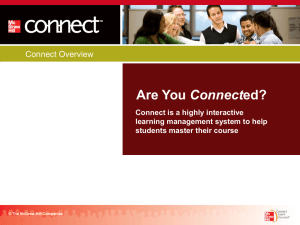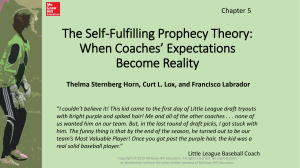
Chapter 16
Integrating and Implementing a
Psychological Skills Training Program
Robert S. Weinberg and Jean M. Williams
Copyright © 2015 McGraw-Hill Education. All rights reserved.
No reproduction or distribution without the prior written
consent of McGraw-Hill Education.
Are Psychological Interventions
Effective in Improving Sport
Performance?
• Of 45 studies on psychological skills training (PST)
programs, 85% found positive performance effects
• Athletes from Olympic level down report that mental
training and discipline play a huge part in their
success
• No ready-made solutions on how coaches and sport
psychologists (SP) can integrate and implement a PST
program
Copyright © 2015 McGraw-Hill Education. All rights reserved. No
reproduction or distribution without the prior written consent of
McGraw-Hill Education.
Who Will Benefit From PST?
• Not just for elite athletes! appropriate for all
athletes!!!
• Ideal time for implementing PST may be with
beginning sport participants
• Young athletes may need adjustments such as:
•
•
•
•
fewer goals
shorter training sessions
simpler verbal instruction
turning the exercises into games
Copyright © 2015 McGraw-Hill Education. All rights reserved. No
reproduction or distribution without the prior written consent of
McGraw-Hill Education.
Who Should Conduct PST Programs?
• Ideal if qualified consulting sport psychologist plans,
implements, and supervises PST
• rarely feasible except at higher levels of competition
• Also coach’s responsibility to provide PST
• Coaching staff should attend most or all of initial
group training sessions when SP conducted
• Tells athletes it’s important
• SP can’t be at all training sessions and competitions
• Fewer content misunderstandings
Copyright © 2015 McGraw-Hill Education. All rights reserved. No
reproduction or distribution without the prior written consent of
McGraw-Hill Education.
Creating Positive Therapeutic
Outcomes
•
SP consultants felt the three most important
characteristics for an effective consultant:
1. Building a connection with the athlete to create
positive change
2. A professional consulting relationship with the
athlete,
3. Assuring that the consulting relationship meets the
needs of the athlete
•
•
Be adaptive in your approach
Counseling competencies…
Copyright © 2015 McGraw-Hill Education. All rights reserved. No
reproduction or distribution without the prior written consent of
McGraw-Hill Education.
Counseling Competencies
• Recognize limits of competency or expertise
• Respect confidentiality
• Recognizing how one’s own values and biases may impact
psychological processes
• Make appropriate referrals
• Understand the athlete culture and influence of the athletic
environment on athletes
• Consider cultural differences (i.e. ethnic and racial diversity
and sexual orientation)
Copyright © 2015 McGraw-Hill Education. All rights reserved. No
reproduction or distribution without the prior written consent of
McGraw-Hill Education.
When to Implement a PST Program
• Best time is during the off season or preseason
• Least desirable time is after the competitive season has started
• Continue PST as long as athlete competes
Copyright © 2015 McGraw-Hill Education. All rights reserved. No
reproduction or distribution without the prior written consent of
McGraw-Hill Education.
When Should Athletes Practice
Psychological Skills?
• Better to have mental training practice occur under
someone’s supervision
• The first or last 15 to 30 minutes of practice, 3-5 days
per week
• Progressive method of practice
• Practicing mental skills should become an integral
part of all physical practices
• Training program does not appear to be something extra
Copyright © 2015 McGraw-Hill Education. All rights reserved. No
reproduction or distribution without the prior written consent of
McGraw-Hill Education.
Time Spent on the PST Program
• First formal exposure, 3-6
months common
• The sport, time available,
existing mental skills, and
commitment of individuals are
all factors to consider in
determining actual length of
time
• As soon as possible, integrate
PST with physical skills practice
Copyright © 2015 McGraw-Hill Education. All rights reserved. No
reproduction or distribution without the prior written consent of
McGraw-Hill Education.
Setting Up PST Program
Self-regulation = People manage their own behaviors that are
directed toward specific goals
• Goal setting, planning, observing, evaluating behaviors, etc.
5 phases of self-regulation:
1.
2.
3.
4.
5.
Problem identification
Commitment to change
Execution of self-regulated change
Manage the environment
Generalization
Copyright © 2015 McGraw-Hill Education. All rights reserved. No
reproduction or distribution without the prior written consent of
McGraw-Hill Education.
Setting Up Program: Do’s and Don’ts
• Explain what sport psychology is and how it benefits the
athlete
• A method to improve, not just seeing a “shrink”
• Educate on your approach
• Emphasize that PST does not mean something psychologically
wrong with them
• No different than staying after practice to work on an important skill
Copyright © 2015 McGraw-Hill Education. All rights reserved. No
reproduction or distribution without the prior written consent of
McGraw-Hill Education.
Setting Up Program: Emphasize Importance
of Mental Training
• In an initial meeting with athletes, you must
convincing them of the need for systematic mental
training
• Ask athletes what percentage of their game is mental
• Provide anecdotes from sport
• Temper expectations - that no amount of mental training
will substitute for poor mechanics, lack of practice, or
limited physical aptitude
Copyright © 2015 McGraw-Hill Education. All rights reserved. No
reproduction or distribution without the prior written consent of
McGraw-Hill Education.
Setting Up Program: Assess Psychological
Strengths and Weaknesses
• Assess with needs assessment
• Oral interview
• Written psychological inventories
• Behavioral observation
• Provide written feedback to athlete on strengths
and weaknesses
• Recommend the type of skills/intervention program
• Critical that athlete accepts the needs assessment
• Performance profiling
Copyright © 2015 McGraw-Hill Education. All rights reserved. No
reproduction or distribution without the prior written consent of
McGraw-Hill Education.
Benefits of Performance Profiling
SP Perspective
Athlete Perspective
• Provides a basis for goal setting
• Identifies athlete mental
strengths and weaknesses
• Raises athlete awareness
• Evaluates and monitors athlete
performance
• Facilitates discussion,
communication, and
interaction within teams
• Raises self-awareness
• Helps decide what to work on
• Motivates to improve
• sets goals
• Monitors and evaluates
performance
• Encourages more
responsibility for
development
Copyright © 2015 McGraw-Hill Education. All rights reserved.
No reproduction or distribution without the prior written
consent of McGraw-Hill Education.
Determine Skills and Sequencing
• How much practice time will be given
on average each week to mental skills
training?
• How many weeks of practice are
available?
• Will there still be time to practice
mental skills after the competitive
season starts, or after the first couple
of losses?
• How interested are the athletes in
receiving mental skills training?
Copyright © 2015 McGraw-Hill Education. All rights reserved. No
reproduction or distribution without the prior written consent of
McGraw-Hill Education.
Mental Skills for Athletes
Basic and necessary psychological
skills
These skills lead to exceptional
athletic performance
Maturational markers
Collective qualities of the team –
impacts team environment and
team success
Copyright © 2015 McGraw-Hill Education. All rights reserved.
No reproduction or distribution without the prior written
consent of McGraw-Hill Education.
Evaluation of Program Effectiveness
• Provides SP and coaches with information
needed to modify their programs
• Allows consumers to give feedback
• Only way to objectively judge whether the
program achieved its goals
Copyright © 2015 McGraw-Hill Education. All rights reserved. No
reproduction or distribution without the prior written consent of
McGraw-Hill Education.
How Evaluate Effectiveness
• Continuously AND a formal total evaluation at the
end of the program
• Asses strengths and weaknesses of the content and
delivery of sessions, especially team sessions
• Include team and individual discussions and written
evaluations by the athletes and coaches
Copyright © 2015 McGraw-Hill Education. All rights reserved. No
reproduction or distribution without the prior written consent of
McGraw-Hill Education.
Practical Pointers
• Provide the What, Why, When, and How of training
• Beginning of session: Outline purpose, content, and length
• At end and after practicing each exercise: Time for
discussion and questions
• Stress Personal Responsibility
• Peak performance is not mysterious; it is a product of the
body and mind, both of which can be controlled
• Be Flexible and Individualized
• Introduce a variety of techniques - no fixed pattern
• Individualize and modify combinations of techniques
• Provide handouts, cassettes, or CD recordings.
Copyright © 2015 McGraw-Hill Education. All rights reserved. No
reproduction or distribution without the prior written consent of
McGraw-Hill Education.
Practical Pointers (cont.)
• Use Goal Setting and Journal Assignments
• Individualize goals
• Encourage recording discoveries and successful strategies
• Pre-competition and Competition Plans
• Create ideal performance state typically associated with peak
performance IN competition
• Help athletes arrange their internal and external worlds so
they are in control
• Stress Application to Other Life Pursuits
• Can use the skills in daily life
Copyright © 2015 McGraw-Hill Education. All rights reserved. No
reproduction or distribution without the prior written consent of
McGraw-Hill Education.
Practical Pointers (cont.)
• Practice It Before Teaching It
• Personal experience increases one’s ability to teach a
specific technique or answer questions
• Teach by Example
• Coaches and SP consultants should be role models
• Observe Practices and Competitions Whenever
Possible
• Provides insights, shows caring, and gains trust of athletes.
Copyright © 2015 McGraw-Hill Education. All rights reserved. No
reproduction or distribution without the prior written consent of
McGraw-Hill Education.
Practical Pointers (cont.)
• Emphasize Strengths as Competition Nears
• Build athlete’s confidence
• Monitor Your Behavior
• Ask someone else to observe and evaluate SP’s behavior
Copyright © 2015 McGraw-Hill Education. All rights reserved. No
reproduction or distribution without the prior written consent of
McGraw-Hill Education.
Ethical Considerations for the Coach and SP
Consultant
Researchers identified four classifications of behaviors
that were difficult ethical situations:
1.
2.
3.
4.
Conflicts with confidentiality
Conflicts between personal values and professional
ethics
Conflicts with dual relationships
Conflicts with self-presentation or advertising
Copyright © 2015 McGraw-Hill Education. All rights reserved. No
reproduction or distribution without the prior written consent of
McGraw-Hill Education.
Potential Problem Areas
• Overcoming player reluctance about participating in a mental
training program.
• Spending too little time with individual athletes in a team
setting.
• Gaining the trust of the athletes.
• Making sure athletes systematically practice their skills.
• Lacking knowledge about the specific sport.
• Maintaining contact with athletes throughout a competitive
season.
• Getting full cooperation from the coaching staff or organization.
Copyright © 2015 McGraw-Hill Education. All rights reserved. No
reproduction or distribution without the prior written consent of
McGraw-Hill Education.








